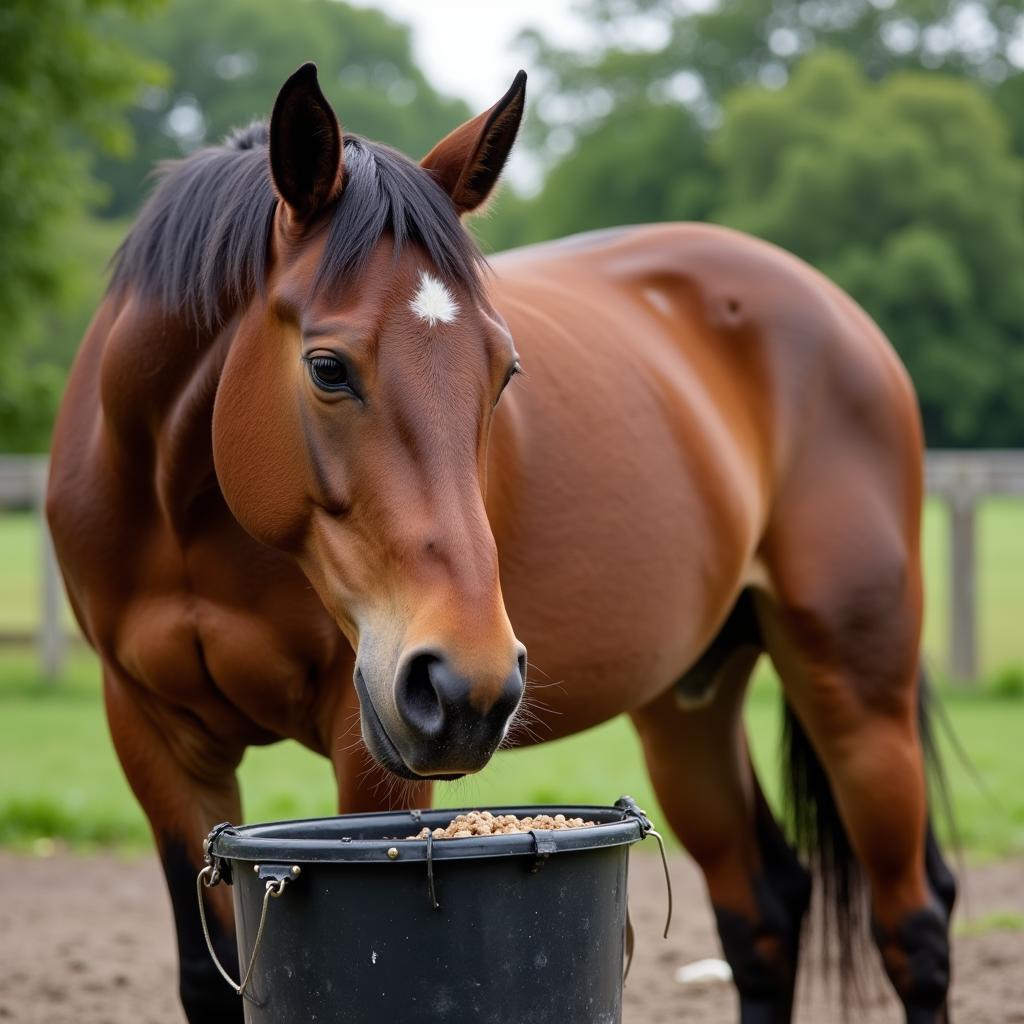A horse balancer is a concentrated feed supplement designed to fill the nutritional gaps in a horse’s diet. Unlike complete feeds, which provide a horse’s entire nutritional needs, balancers offer a concentrated source of vitamins, minerals, and other essential nutrients often lacking in forage-based diets. But when should you consider adding a balancer to your horse’s feeding regimen?
This comprehensive guide delves into the world of balancers for horses, covering everything from their purpose and benefits to choosing the right one for your equine companion.
What is a Balancer for Horses?
As mentioned, a balancer horse is a feed supplement formulated to provide essential nutrients that may be missing from your horse’s regular diet. Imagine it as a multivitamin for your horse, ensuring they receive a balanced intake of vitamins, minerals, and amino acids.
Why are Balancers Important for Horses?
Even if your horse enjoys a diet primarily composed of hay or pasture, they might not receive the full spectrum of nutrients required for optimal health. This is where balancers come into play. Here’s why they are crucial:
- Bridging Nutritional Gaps: Forage quality can vary significantly. Balancers help bridge those gaps and ensure your horse receives a consistent supply of essential nutrients.
- Supporting Overall Health: A balanced diet contributes to a robust immune system, healthy hooves, a shiny coat, and overall well-being.
- Addressing Specific Needs: Balancers are available in various formulations to address specific needs, such as those for senior horses, growing youngsters, or performance horses.
- Preventing Deficiencies: Nutritional deficiencies can lead to various health issues in horses. Balancers help prevent these deficiencies by providing the necessary nutrients in appropriate amounts.
 Horse Eating Balancer from Bucket
Horse Eating Balancer from Bucket
When to Consider a Balancer for Your Horse
Determining whether your horse needs a balancer requires careful consideration of their individual needs and lifestyle. Here are some scenarios where a balancer might be beneficial:
- Limited Pasture Access: If your horse has limited access to fresh pasture, their diet might lack essential nutrients.
- Poor Forage Quality: Even if your horse consumes enough hay, its nutritional content might be insufficient, especially during certain seasons.
- Picky Eaters: Some horses are notoriously picky eaters. A palatable balancer can entice them to consume necessary nutrients.
- Specific Life Stages: Growing horses, pregnant or lactating mares, and senior horses have increased nutritional demands that a balancer can help meet.
- Performance Horses: Horses involved in strenuous activities require additional nutrients to support their energy levels and muscle recovery.
How to Choose the Right Balancer
Selecting the appropriate balancer for your horse involves considering several factors:
- Life Stage: Choose a balancer formulated for your horse’s specific life stage—foal, adult, senior, etc.
- Activity Level: Consider your horse’s workload. Performance horses require different nutrient ratios than leisure horses.
- Health Conditions: If your horse has any underlying health conditions, consult your veterinarian for recommendations.
- Ingredients: Opt for high-quality ingredients and avoid unnecessary fillers or artificial additives.
- Palatability: Choose a balancer your horse finds appealing to ensure they consume it readily.
Incorporating a Balancer into Your Horse’s Diet
Once you’ve chosen a suitable horse feed balancer, follow these steps for safe and effective incorporation:
- Gradual Introduction: Introduce the balancer slowly over several days to prevent digestive upset.
- Follow Feeding Instructions: Adhere to the manufacturer’s recommended feeding rates.
- Monitor Your Horse: Observe your horse for any changes in appetite, weight, or overall health after introducing the balancer.
 Equestrian Measuring Horse Balancer
Equestrian Measuring Horse Balancer
Common Misconceptions about Balancers
Despite their benefits, some misconceptions surround balancers for horses. Let’s debunk a few:
- Balancers are Only for Underweight Horses: While balancers can help improve weight, their primary function is to provide balanced nutrition, regardless of weight.
- Balancers are a Substitute for Forage: Balancers are supplements, not meal replacements. Forage should still constitute the majority of a horse’s diet.
- All Balancers are Created Equal: Balancers vary significantly in their formulations. Choose one that aligns with your horse’s individual needs.
Barley Grain for Horses and Balancers
While a balancer offers a concentrated source of micronutrients, you might wonder about using whole grains like barley in your horse’s diet. Barley grain for horses can be a valuable source of calories and energy, particularly for those needing weight gain or involved in strenuous work. However, it’s essential to remember that grains alone won’t provide the complete nutritional balance that a balancer offers.
Conclusion
Providing your equine companion with optimal nutrition is paramount to their health and well-being. A well-chosen balancer can play a crucial role in filling nutritional gaps, supporting overall health, and addressing specific needs. By understanding the benefits, selection criteria, and proper usage of balancers, you can ensure your horse thrives on a balanced and complete diet.
Remember, always consult your veterinarian or an equine nutritionist for personalized advice tailored to your horse’s individual requirements.
Frequently Asked Questions (FAQ)
1. Can I give my horse a balancer if it’s already overweight?
While balancers can help improve weight in underweight horses, they are not ideal for overweight horses. Consult your veterinarian for dietary recommendations.
2. How long does it take to see results from a balancer?
It might take several weeks to notice visible changes, such as improved coat condition or hoof quality.
3. Can I feed my horse a balancer without any hay?
No, balancers are supplements, not meal replacements. Forage should always make up the majority of a horse’s diet.
4. Are balancers suitable for all horses?
Most horses can benefit from a balancer; however, it’s crucial to choose one that aligns with their individual needs and life stage.
5. What happens if I give my horse too much balancer?
Overfeeding any supplement can be detrimental. Always adhere to the manufacturer’s recommended feeding rates and consult your veterinarian if you have concerns.
Need More Help?
Do you have questions or need assistance finding the perfect products for your horse’s needs? Don’t hesitate to contact our dedicated customer support team available 24/7. Call us at 0772127271, email us at [email protected], or visit our location at QGM2+WX2, Vị Trung, Vị Thuỷ, Hậu Giang, Việt Nam. We’re here to help you every step of the way!
Explore our website for more insightful articles on equine care, nutrition, and a wide range of products designed to keep your horse happy and healthy.